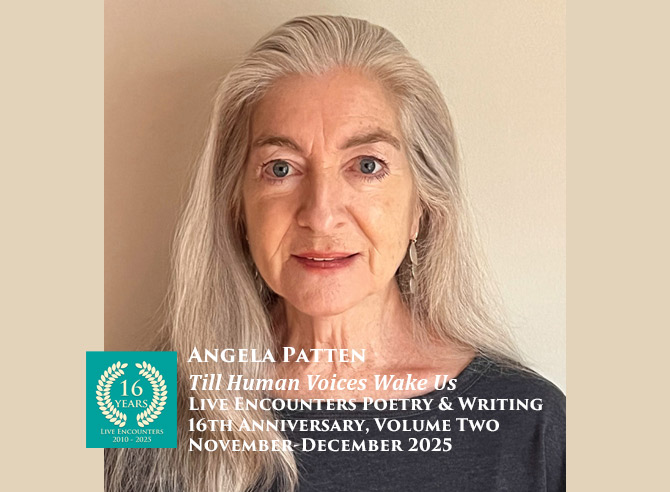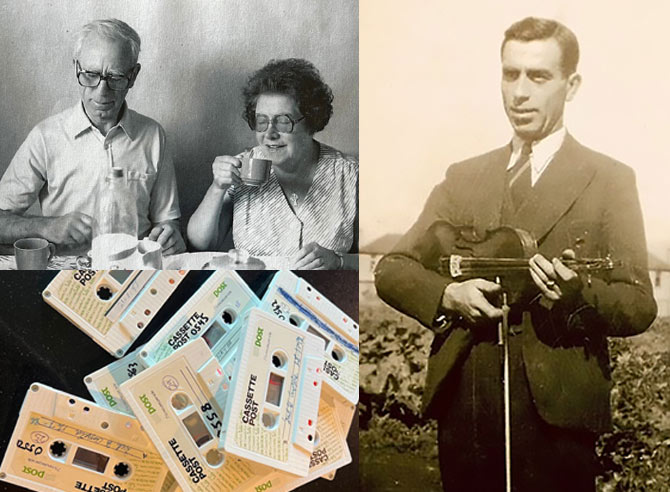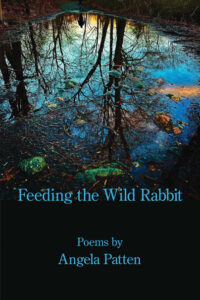
Live Encounters Poetry & Writing 16th Anniversary Volume Two
November- December 2025
Till Human Voices Wake Us, guest editorial by Angela Patten.

It is widely accepted that the oral tradition is still alive and well in Ireland and that the country is positively stuffed with friendly, garrulous and eloquent people who can’t wait to share the gift of the gab with all and sundry. While it is true that Celtic customs, beliefs and historical events were not written down but were passed on through poems, songs and stories for thousands of years, one wonders how the oral tradition is holding up under the weight of the internet, television, and the mobile phone.
When I was growing up in Dublin during the 1960s, the oral tradition was kept vividly alive by my mother and her relatives, all of whom could have talked for Ireland. Throughout my childhood, I listened to them recite poems, sing songs and spin endless stories about their childhood adventures. Both my parents, like others of their generation, turned to poetry for the pleasure of sound and rhythm but also for the message or moral it was sure to contain. There was no distinction between a line from Shakespeare, a religious platitude, or an old proverb when it came to finding the appropriate word for the occasion.
Even within her own loquacious family, my mother was famous for her incessant talking. My father, the quieter of the two, was also attentive to words and especially to accents. He was proud of his ability to tell which county in Ireland a person was from within minutes of conversation. After decades in Dublin, he still spoke with a rich County Meath accent that was distinctly different from ours, and he used a lot of strange words that turned out to be Irish. He called a jumper a gansey and a corner-boy a bowsey. I was his Alanna and our John was his amhic or gossún. Instead of a simple “no,” he said “divil a bit,” and he told our mother to “whisht” when he wanted to get a word in edgeways. Our whole family loved words and accents and we particularly enjoyed listening to exaggerated Dublin accents on Radio Eireann comedy programs, never thinking that we had a curious accent of our own.
When our mother was alive, she did most of the talking. She also did all the letter-writing to her children in foreign countries. I moved to the U.S. in 1977, one of my sisters went to Germany in 1980, and my other sister went to Switzerland in 1986. Our brother was the only one of us who stayed in Ireland. After our mother died in 1988, it was a challenge for Dad to stay in touch by letter. He had a hereditary shake in his hand that made it almost impossible for him to write. As if in answer to his dilemma, An Post (the Irish Post Office) created “Talk Back Cassette Post,” talk-a-letters that provided seven-and-a-half minutes of tape on either side so Irish people could send voice messages to their families abroad. I have a collection of around two dozen of those white plastic tapes, printed in green in both Irish and English, most of them recorded by my father in the 1980s and 90s during the fifteen years that he lived alone after my mother died.
I could picture the post office where Dad purchased the tapes. It was across the street from our house in the newsagents’ shop where we bought sweets, ice cream, broken biscuits, newspapers, our beloved weekly British comics, and much more. The post office was located in a corner of the shop, designated by a window with a little grille through which the postmistress sold postage stamps and savings stamps, doled out the monthly children’s allowances, and gossiped with customers. I could imagine my father talking about his eldest daughter who had “gone out to America” as he posted the tapes.
These days, Facetime and WhatsApp have made communication cheap and easy. I think of my terrible homesickness when I first came to the U.S. and how it might have been relieved by a Facetime chat. Instead there were weeks between letters and only occasional phone calls that served as reminders of the width of the ocean that lay between us. The talk-a-letter tapes were a great advance in technology in the days before mobile phones.
The tapes usually began with the words, “Hello, Angela. Daddy here,” followed by the date. Dad’s messages were not always cheerful. He was terribly lonely in the years after our mother died. But he had visits with his sisters-in-law, kind neighbors who passed the time of day, and his music sessions at the weekends. He was an accomplished fiddle player and he regularly attended the sessions at Comhaltas Ceolteori Eireann, the local Irish music venue. Loneliness drove him to join a retirement group and he exerted his considerable charm, reciting poems he had memorized as my mother had done in the past, and taking bus tours with the other retirees to various parts of the country. He reported on all these adventures on the cassette tapes – my aunt drinking her tea and smoking a cigarette by the fireplace, the flowers and vegetables he grew in the garden, a great night at the music session – and I responded with news of my studies, my son’s progress at school, and other entertaining tidbits, carefully omitting any mention of the heartache and heartbreak that were also part of the picture.
My first collection of poetry was titled “Still Listening.” And no wonder. It was only after I left Ireland that I began to appreciate the way people talked there. My first poems were an attempt to conjure those voices and the peculiarly Irish expressions I had gleaned during my childhood. My most recent collection of poems also focuses on words and their multiple meanings. Whenever I go back to Ireland, I am gobsmacked by all the words and phrases I had forgotten and I often pick up new expressions that become fodder for poetry. During my last visit I was driving with my brother when he called his daughter to say, “We’ll be there within the bones of an hour.” I gleefully stole the phrase and made it the title of my new poetry manuscript.
The human voice is both intimate and ephemeral. Children’s voices change and deepen and ultimately disappear as they grow older. Before we had the tools to capture them on audio, each voice died with the individual. After Dad died, it took some time before I could bear to listen to his voice on the tapes. But now that he is long gone, I realize how important the cassettes were in preserving his unique voice and accent, and his way of talking.
During a recent flood at our house when friends and neighbors were running around with mops and towels, putting random objects under the feet of the furniture, I discovered that one friend had rescued the cardboard box that held my father’s cassette tapes from under the bed and was wiping each one down and setting it out to dry. I was touched that he had gone to the trouble of rescuing them but he must have realized that such old and outdated items had sentimental value.
Although I had most of them converted to a digital format years ago, those white plastic miniatures are nevertheless precious artifacts. In these days of Chatbots and AI, they are a reminder of the power of the human voice to convey the essence of a person, the sense of a previous era, and the pleasures of the spoken word.
© Angela Patten
 Angela Patten’s publications include five poetry collections, most recently Feeding the Wild Rabbit (Kelsay Books), and a prose memoir, High Tea at a Low Table: Stories From An Irish Childhood (Wind Ridge Books). Winner of the 2022 Anthony Cronin International Short Poem Award and other awards, Patten has received grants from the University of Vermont, the Vermont Arts Council, and the Vermont Community Foundation. Her work has appeared in many literary journals and in anthologies, including The Field Day Anthology of Irish Writing and The White Page/An Bhileog Bhan: Twentieth-Century Irish Women Poets. Born and raised in Dublin, she maintains dual citizenship in Ireland and the U.S. She lives in Burlington, Vermont, where she is a Senior Lecturer Emerita in the English Department at the University of Vermont. www.carraigbinn.com
Angela Patten’s publications include five poetry collections, most recently Feeding the Wild Rabbit (Kelsay Books), and a prose memoir, High Tea at a Low Table: Stories From An Irish Childhood (Wind Ridge Books). Winner of the 2022 Anthony Cronin International Short Poem Award and other awards, Patten has received grants from the University of Vermont, the Vermont Arts Council, and the Vermont Community Foundation. Her work has appeared in many literary journals and in anthologies, including The Field Day Anthology of Irish Writing and The White Page/An Bhileog Bhan: Twentieth-Century Irish Women Poets. Born and raised in Dublin, she maintains dual citizenship in Ireland and the U.S. She lives in Burlington, Vermont, where she is a Senior Lecturer Emerita in the English Department at the University of Vermont. www.carraigbinn.com
“Feeding the Wild Rabbit.” Cover photo credit: Zak Patten. Link to purchase the book: Feeding the Wild Rabbit


Wonderful, Angela! That really brings back the memories. Ní bheidh a leithéid arís ann!
Go raibh míle math agat, a dheartháir is dílse.